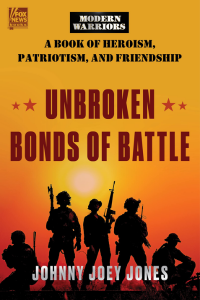In this highly anticipated follow-up to The Rifle, Andrew Biggio brings to light more untold stories from the quickly vanishing ranks of the veterans of World War II. They are called the Greatest Generation, but they were also ordinary men, sharing in all of humanity’s weaknesses and flaws while responding to the call of duty. These are their unforgettable stories—first-person accounts from the last of the soldiers, sailors, airmen, and Marines who fought the most dreadful war in history, all collected by a veteran of the wars in Iraq and Afghanistan.
For many people, military service isn’t simply a job. It’s a ticket out of a lonely society and into a family of enduring bonds. In over a decade of working with veterans, Johnny Joey Jones has discovered the power of battle-forged friendships. Suffering a life-changing injury while deployed in Afghanistan, he faced a daunting recovery. But coming home would have been much harder without the support of his brothers and sisters in arms. Jones tells the stories of those very warriors, who for years have supported and inspired him on the battlefield and off.
At the height of World War II, LOOK Magazine profiled a small American community for a series of articles portraying it as the wholesome, patriotic model of life on the home front. Decades later, author Matthew Rozell tracks down over thirty survivors who fought the war in the Pacific, from Pearl Harbor to the surrender at Tokyo Bay. These are the stories that the magazine could not tell to the American public. This book brings you the previously untold firsthand accounts of combat and brotherhood, of captivity and redemption, and the aftermath of war.
Over one million Black men and women served in World War II. Black troops were at Normandy, Iwo Jima, and the Battle of the Bulge, serving in segregated units and performing unheralded but vital support jobs, only to be denied housing and educational opportunities on their return home. Without their crucial contributions to the war effort, the United States could not have won the war. And yet the stories of these Black veterans have long been ignored, cast aside in favor of the myth of the “Good War” fought by the “Greatest Generation.”
In 1943, while the New York Yankees and St. Louis Cardinals were winning pennants and meeting in that year’s World Series, one of the nation’s strongest baseball teams practiced on a skinned-out college field in the heart of North Carolina. Ted Williams, Johnny Pesky, and Johnny Sain were among a cadre of fighter-pilot cadets who wore the Cloudbuster Nine baseball jersey at an elite Navy training school at the University of North Carolina at Chapel Hill. With the help of rare images and insights from World War II baseball veterans, the story of this remarkable team is brought to life.
Vietnam became the Western world’s most divisive modern conflict, precipitating a battlefield humiliation for France in 1954, then a vastly greater one for the United States in 1975. Max Hastings has spent the past three years interviewing scores of participants on both sides, as well as researching a multitude of American and Vietnamese documents and memoirs, to create an epic narrative of an epic struggle. No past volume has blended a political and military narrative of the entire conflict with heart-stopping personal experiences, in the fashion that Max Hastings’ readers know so well.
When Admiral William Halsey selected Destroyer Squadron 21 (Desron 21) to lead his victorious ships into Tokyo Bay to accept the Japanese surrender, he chose the most battle-hardened US naval squadron of the war. But it was not the squadron of ships that had accumulated such an inspiring résumé; it was the people serving aboard them who won the battles. This is the story of Desron 21’s heroic sailors whose battle history is the stuff of legend.
After three Army deployments—earning two Bronze Stars and a Combat Infantryman’s Badge—Pete Hegseth knows what it takes to be a modern warrior. In Modern Warriors he presents candid, unfiltered conversations with fellow modern warriors and digs for real answers to key questions like: What inspired them to serve? What is their legacy? What does sacrifice really mean to them? How do they handle loss? And what can civilians learn from this latest generation of veterans?
In April 2004, soldiers from the 1st Cavalry Division were on a routine patrol in Sadr City, Iraq, when they came under surprise attack. Over the course of the next forty-eight hours, 8 Americans would be killed and more than 70 wounded. Back home, as news of the attack began filtering in, the families of these same men, neighbors in Fort Hood, Texas, feared the worst. The firefight in Sadr City marked the beginning of the Iraqi insurgency, and Martha Raddatz has written perhaps the most riveting account of hand-to-hand combat to emerge from the war in Iraq.













